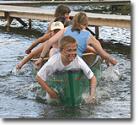It's Not Your Parents' Arthritis: Camp Dartmouth Hitchcock
July 19, 2013
Lebanon, NH
For pictures of Camp Dartmouth Hitchcock, enjoy our slideshow!
When you hear the word arthritis you likely think of it as an affliction of aging, however, according to the Arthritis Foundation: "Approximately 294,000 children under the age of 18 are affected by pediatric arthritis and rheumatologic conditions."
"Kids do get arthritis," says Daniel Albert, MD, Section Chief of Rheumatology, "and it's just as severe as adults' in terms of causes and the treatments. Children with juvenile rheumatoid arthritis (JRA) are in need of medical care as well as social and psychological support just like anyone with a chronic disease." As Director of Camp Dartmouth Hitchcock, Dr. Albert also knows that all kids need to have fun.
A Tradition of Fun
For the past 30 years, Camp Dartmouth Hitchcock has been a place for children with JRA and other rheumatologic conditions to enjoy a summer camp experience with their peers in a safe and medically supervised environment. It is one of the oldest JRA camps in the country, founded in 1983 by the late Dr. Joshua Burnett, first Section Chief of Rheumatology at Dartmouth Hitchcock.
"It's a place for children to feel like themselves and be able to relate with other campers," says Lauren Sanderson administrative assistant in the Section of Rheumatology at Dartmouth Hitchcock and Camp Dartmouth Hitchcock. "They are just normal children, but they get sore and may tire a little more easily."
The camp accepts children and teens from ages 8 to 17. For many of the younger campers, this is the first overnight without mom or dad: Sanderson laughs, "sometimes they write on their applications ‘Mom's scared; this is the first time away from home.'"
Each year, in the third week of August, the camp is held on Lake Morey at the Hulbert Outdoor Center in Fairlee, Vermont. The campers sleep in open-air tents with boys and girls in separate units, but they all eat s'mores together around the campfire. "We do all the activities of a regular camp," says Albert. There are ropes course, sailing, arts and crafts, swimming, hiking, canoeing, fire-building, and even archery and riflery taught by certified instructors. What campers do is based on individual condition and ability, but, Albert says, "If you were at the camp you might not even know they are kids with arthritis, however, no physical limitation would prevent a child from coming to the camp. We would make appropriate accommodations."
The Gift of Time and Expertise
Although the camp is focused on fostering independence while having fun, many of the staff are physicians, nurses, and other medical personnel who volunteer their time and expertise. "The first day that kids come into camp they're all screened by a physician and we look for any medical issues," says Albert. Throughout the week nurses distribute and handle medications and shots based on individual needs and conditions.
The majority of counselors were once campers themselves. This, Albert says, "is because campers look at Camp Dartmouth Hitchcock as a way of finding comrades that are similarly affected. They have very intense bonding and say that this is the most important thing that ever happened to them—finding close personal relationships with peers."
Like volunteers, campers come from all over. "Many are referred to us, others hear about us through the Arthritis Foundation that often pays for the camper's fee," explains Albert.
Return on Assets
The week of camp cost each camper approximately $625. "Because we rent the facility, each year their cost goes up, so ours may go up as well," says Sanderson. "This year an anonymous donor who was in camp over a decade ago has started to fund a camper every year. This was the first year we awarded it. It's a nice gift for our 30th anniversary." In October, thanks to Dartmouth Health Children's, Camp Dartmouth Hitchcock will participate in the CHaD Half Marathon and the majority of what the team collects will support the camp. "CHaD has been a great supporter of ours," says Sanderson. Albert agrees and adds, "We're always in need of support and depend on donations whether it's directly to Camp Dartmouth Hitchcock or through the Arthritis Foundation to support the tuition of the kids."
Funding also helps pay for entertainment night, sometimes with a comedian, puppeteer, or other hired fun. The campers also enjoy other evening activities like a dance: "They free-style dance with glow sticks and just have fun," says Sanderson. Sometimes the kids put on a talent show and do a skit or play instruments. As the week winds down campers always have a candle ceremony: "Everyone gets a candle, we gather in the barn and light them, then whoever wants to talks about their week. It gets very personal."
On the very last night everyone gets dressed-up for the closing ceremony and graduation for campers who have turned 18 or are going into their last year of high school. "The graduates sit at the head of the table and a counselor says a short speech about them before the camper shares something about their journey and plans, and usually about how the camp has changed them. We all get very emotional and little teary-eyed."
Happy 30th Anniversary Camp Dartmouth Hitchcock!
A Summer Camp that Offers More than S'mores
Dartmouth Medicine, Summer 2006
"Though we do need to distribute medications, and we have two nurses who are here full-time," explains Kerin, a rheumatologist, "we try not to make it about that." And the results, he says, are "just tremendous."
